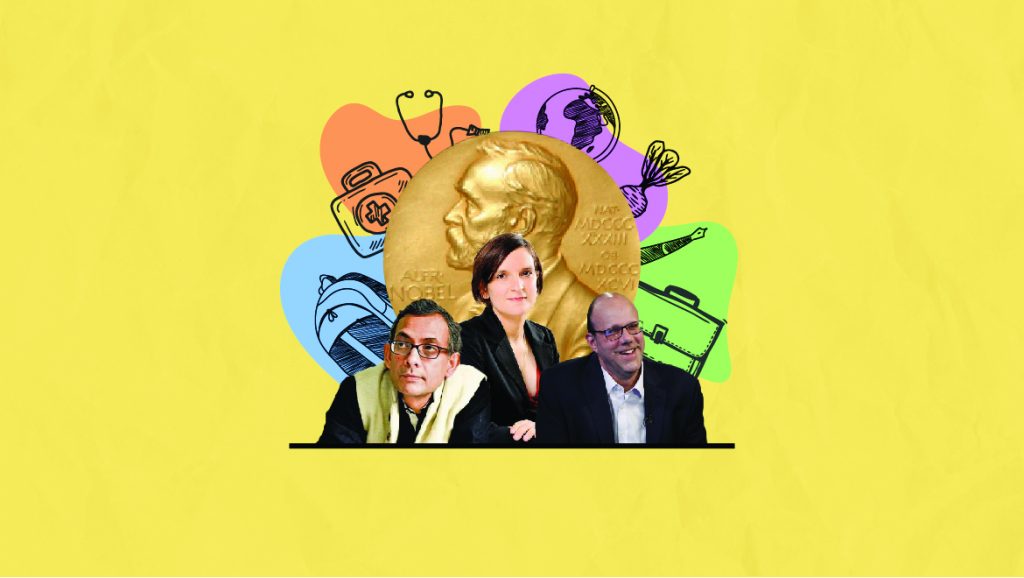Last Updated on Dec 30, 2019 by Komal Roy
On 14th October 2019, three economists, the couple Abhijit Banerjee and Esther Duflo, and Michael Kremer were awarded the Sveriges Riksbank Prize in Economic Sciences in Memory of Alfred Nobel. Customarily known as the Nobel prize, the trio received the award for their contribution to development economics, the field that deals with the developmental process of economic, fiscal, and social conditions in developing countries.
While the couple Abhijit Banerjee and Esther Duflo are at Massachusetts Institute of Technology, Cambridge, Michael Kremer is at Harvard University, also in Cambridge. Further, Esther Duflo is the only woman among other Nobel Prize winners of 2019, which is significant in the significance of gender equity. The three economists shared the Nobel Prize 2019 for Economics. In addition, the trio, together, received Nobel Prize money of 9 million Swedish kronor, which equals $9,10,000.
Drastic numbers of world poverty — food for thought
According to the 2019 Global Multidimensional Poverty Index (MPI), 23.1% of the world population that equals 1.3 billion people across 101 countries are multidimensionally poor. They live on less than $1.25 per day.
Multidimensional poverty means poverty resulting from various deprivations such as hazardous living areas, lack of education, poor healthcare, lack of work opportunities, and violence.
The trio’s contribution to development economics
Among other things, development economics also investigates the causes of global poverty and finds ways to combat it. However, theory only gives the picture of the issue at hand to design policies that can combat the challenge but it doesn’t guarantee the effectiveness of a specific policy in real-time practice. Only practical study is capable of showing the significance and urgency of addressing a problem at hand, and poverty being a long-time, massive global issue, is certainly not something you can solve through outdated and failed theoretical policies in the short-term.
This inspired the three economists to take an experimental approach to find practical measures that can eradicate poverty over time. They conducted on-the-field research on the life and behaviour of the poor to find reasons for their unfortunate situation and accordingly formulated practical policies that worked in improving their lifestyle. Their experiments have had far-reaching impacts and improved education and health in developing economies such as India and Kenya. The Nobel Prize Committee thus acknowledged their contribution to enhancing the ability to alleviate global poverty and rewarded them with Nobel Prize.
Overview of the experimental approach of research
The approach adopted by the laureates is used to solve a massive problem by dividing it into smaller, attainable questions — for instance, finding ways to improve the working conditions, encourage education or offer quality healthcare services. This method, the trio believe, helps in finding practical solutions for a massive issue by employing carefully designed experiments on the affected population.
Riding on this idea, the trio conducted randomized controlled trials to find ways to tackle global poverty and improve health. Randomized controlled trials, which are applied in the medical field, involve studying random groups — one group receives an ongoing, regular treatment and the other receives a particular social intervention such as food subsidy and free vaccination. The results of the study conducted on both the groups are then compiled, compared and used to draw a conclusion based on which practical polices to tackle the issue are developed.
This approach was first adopted by Michael Kremer and his colleagues in the mid-1990s in Kenya. Their objective was to investigate whether students perform better on receiving resources such as free mid-day meals from their schools, but the results were negative. When Abhijeet Banerjee and Esther Duflo conducted similar trials on some Indian schools that received social intervention, they found out that offering targeted remedial tuitions helped children with special educational needs and not offering extra resources.
Similarly, the trio has used randomised controlled trials to study issues such as poverty, gender inequality, and poor healthcare in several countries and achieved great results. Now, their research methods rule the roost in development economics.
Findings of the research
The following are two findings of the trio based on randomised controlled trials:
- Kremer and team: The instances of parents earning a low income giving their children deworming pills were higher when the medication was subsidized than when it was free.
- Banerjee, Duflo, and team: The livelihood of the poor belonging to 6 low- and middle-income countries improved for at least a year after cutting off 2-yr support in the form of money, food, advice, skills training, and healthcare services.
- Banerjee and Duflo: Poor families are assumed to be hungry and use extra money to buy healthy food. But, in reality, they spend it on televisions, expensive food or festivals.
The success of the randomised controlled trials approach
The following are two success stories of the research, among others:
- Encouraged subsidies for preventive healthcare in various countries
- Improved the quality of remedial tutoring in Indian schools, which has benefited over 5 million children
The trio are believed to be the forerunners of the ‘randomista movement’. They are humbled by the Nobel Prize Economics 2019 and the world-wide appreciation that they have received.




